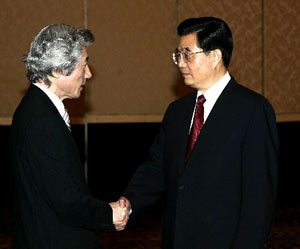
Chinese President Hu Jintao said here Saturday Japan should seriously reflect
over its wartime history and properly handle the current difficult situation in
the Sino-Japanese relations.
During talks with Japanese Prime Minister Junichiro Koizumi on the sideline
of the Asian-African summit in Jakarta, Hu said some deeds by the Japanese side
recently has breached its commitment to its attitude toward its wartime history
and to the Taiwan questionin addition to visits to the notorious Yasukuni
Shrine, thus falling away from the political basis for the Sino-Japanese
relations.
Earlier this month, Japan's education ministry approved revised history
textbooks, which have been criticized by some Asian countries for distorting
history and whitewashing Japan's colonial rules and wartime atrocities. The
textbook issue triggered protests in Asian countries including China and South
Korea.
Hu said such deeds by Japan had hurt deeply the feelings of the Chinese
people and peoples of other Asian nations, and had aroused discontent among
them.
The president said both China and Japan are countries with huge influence in
Asia and across the world, adding that soured ties are not only detrimental to
the two countries but also affect stability and development of Asia and the
world at large.
Hu said the Chinese side will not change the guidelines of developing
friendly cooperative relations with Japan. He urged Japan to properly handle the
current difficult situation and take concrete measures to push Sino-Japanese
relations back to the track of healthy and stable development.
Hu initiated five proposals on developing the Sino-Japanese relations.
First, the Japanese government should strictly abide by the Sino-Japanese
Joint Statement, the Peace and Friendship Treaty, and the Sino-Japanese Joint
Declaration, take specific actions to forge a friendly and cooperative
relationship with China facing the 21st century.
Secondly, the Japanese government should regard history as a mirror to
reflecting on its wartime past. The aggression by the Japanese militarists
against China in the 1930s and 40s brought tremendous loss and suffering to the
Chinese people.
Remorse expressed for Japan's aggression against China and other Asian
countries should be translated into action and no moveshould be made to hurt the
feelings of the Chinese people and the people of other Asian countries again.
The Japanese side should take a serious and conscientious attitude toward the
history, and deal with historic problems in a serious and sincere manner.
Thirdly, the Taiwan question should be correctly handled. The issue lies in
the core of China's interest, involves the national sentiment of 1.3 billion
Chinese people. China hopes the Japanese side fulfill its commitments by
demonstrating through concrete actions its adherence to the one-China policy and
opposition to Taiwan independence.
Fourthly, differences between the two nations need to be resolved through
dialogues and peaceful negotiations. The two governments should actively work
together to protect the relationsfrom being hurt again.
Fifthly, the two countries should further strengthen communication and
cooperation in various areas, encourage friendlycontacts and activities between
the two peoples, so as to further increase understanding and broaden mutual
benefits, pushing the Sino-Japanese relations forward in a healthy and stable
pace.
For his part, Koizumi stressed the importance of the development of
Sino-Japanese friendship, saying it is not only beneficial to China and Japan,
but also has great influence in Asia and the international community.
The rapid development of China is a chance rather than a threatto Japan and
this has gradually been accepted by more and more Japanese people, he said.
The prime minister said Japan will take vigorous actions to promote the
friendly cooperative relationship between China and Japan in the spirit of
president Hu's five proposals.
On the questions of history and Taiwan, Koizumi said the Japanese government
will adhere to the principles laid out in the three documents signed between
Japan and China and his government's stance has been maintained without any
change.
Koizumi said he fully agreed with president Hu' proposal on resolving all the
disputes between the two countries through dialogue.
At the end of the closed door talks, President Hu expressed hishope that the
two countries will regard the meeting as a turning point and take feasible
measures to solve disagreements, surmount difficulties and make joint efforts to
push the bilateral relationto develop healthily and steadily.



